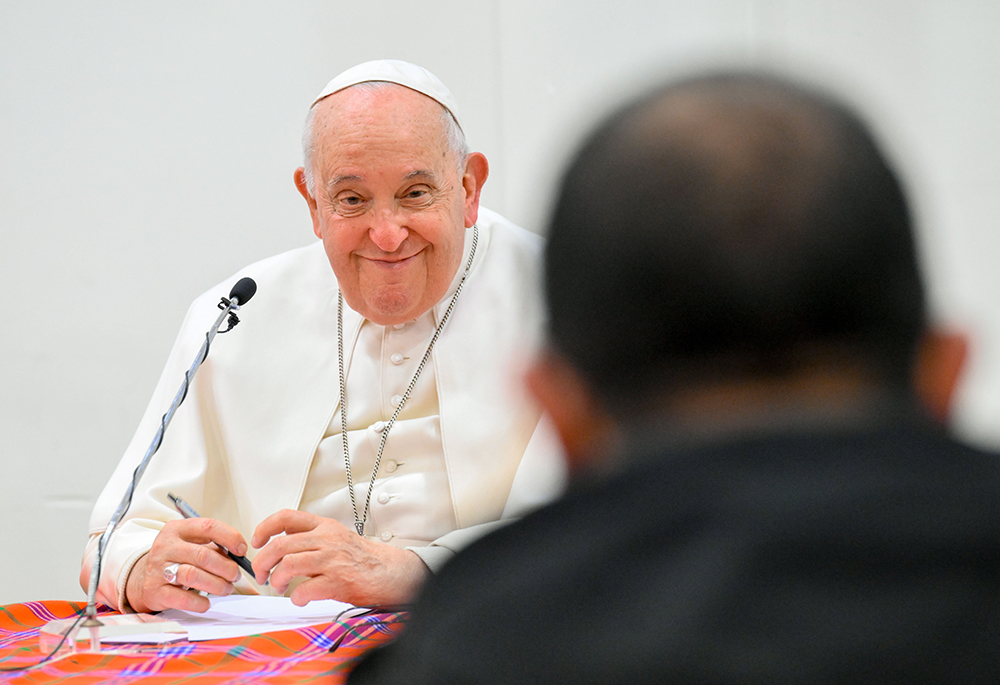
Pope Francis smiles as he meets with some 30 priests — Canossian Fathers and priests from the Diocese of Rome — in the pastoral center of St. George of Acilia Parish in south Rome Dec. 21, 2023. (CNS/Vatican Media)
The Vatican's recent decision to allow priests to bless people in same-sex relationships, as spelled out in the declaration Fiducia Supplicans, is, of course, great news for LGBTQ+ Catholics. It represents a great shift away from the centuries of formal censure and exclusion which LGBTQ+ people have suffered in the Catholic Church.
This document, however, is more significant for what it has to say about eligibility for same-gender couples (and by a safe assumption, everyone else) to be blessed by church representatives, which is spelled out in Paragraph 25. This passage warns that "an exhaustive moral analysis should not be placed as a precondition for conferring" a blessing. The paragraph says that the church must avoid "resting its pastoral praxis on the fixed nature of certain doctrinal or disciplinary schemes."
Paragraph 25 is revolutionary because it overturns the dominant pastoral approach the Catholic Church has taken over the centuries, an approach which emphasized policing for doctrinal orthodoxy and demanding strict obedience over offering welcome and extending mercy. This approach became almost fetishized during the papacies of John Paul II and Benedict XVI. While many people suffered because of this approach, from the early 1980s until the election of Pope Francis, LGBTQ+ people were often singled out for "exhaustive moral analysis" before they were deemed eligible for participating actively in church life. First and foremost, gay and lesbian people were highly suspect because it was often presumed that they were sexually active, and most likely promiscuously so.
No other group's sexuality came under such careful scrutiny from church leaders. The sexual behavior of unmarried heterosexual couples who were living together was not regularly used as a reason to exclude them from participating in the church. Even youth and young adults, whose powerful hormonal impulses and natural curiosity predisposed them to experiment sexually, were not routinely treated as pariahs by church officials. Married couples who chose to use birth control were never summarily excluded from the community.
While regular old-fashioned homophobia may have played a role in such prejudiced and discriminatory pastoral attitudes towards gay and lesbian people, we have to remember that the way these attitudes and practices were justified was through support from church doctrine. Pro-LGBTQ-theologians were censured. Supportive pastoral ministers were excluded from church programs. And, of course, LGBTQ+ people were not only not blessed, but often directly turned away from Catholic spaces, including parishes. The basis for these harsh responses was often the 1986 letter from the Congregation for the Doctrine of the Faith which called a same-gender sexual orientation an "objective disorder" which could lead to an "intrinsic moral evil."
The 1986 letter spawned similar doctrinal licenses to exclude as its principles were expounded in the Catechism of the Catholic Church, the United States Conference of Catholic Bishops' 2006 "Ministry to Persons with a Homosexual Inclination: Guidelines for Pastoral Care," and numerous statements and instructions from individual bishops.
The only thing that Catholic leaders seemed to be able to say to LGBTQ+ people was "No." This attitude of responding to LGBTQ+ people only through a lens of doctrine (which has been increasingly challenged by more and more theologians and bishops) continues to this day. It is what supports church leaders who fire LGBTQ+ people from jobs at Catholic schools and parishes. It is behind the mania of morality clauses in church institutions. It undergirds the restrictive policies on gender conformity many dioceses have instituted. And it is the basis of bishops' supporting laws which criminalize LGBTQ+ people.
Advertisement
Fiducia Supplicans puts an end to the era of doctrinal policing, a policy which Francis has been promoting since the beginning of his papacy. Francis' policy was not only for LGBTQ+ people but for anyone who was wounded by draconian applications of "pastoral care." This new document quotes from the pontiff's first official document, the apostolic exhortation, Evangelii Gaudium, in which he instructed avoiding "a narcissistic and authoritarian elitism, whereby instead of evangelizing, one analyzes and classifies others, and instead of opening the door to grace, one exhausts his or her energies in inspecting and verifying."
Pope Francis had already signaled this shift in emphasis when he reorganized the Vatican Curia in 2022, removing the Dicastery for the Doctrine of the Faith from its preeminent position in the church's bureaucracy and elevating the Dicastery for Evangelization to this exalted position. Outreach to people is more important to this pope than defending insular church doctrines.
The pontiff also recognizes that people are valuable in and of themselves, not in how well they adhere to church teaching. An individual's relationship with God is a much more complex dynamic than how well one follows each and every rule in the church.
In a bit of correspondence that I had with Pope Francis in 2021, he strongly affirmed a quotation about God's mercy which I included in my letter to him. The quotation comes from the closing chapter of Graham Greene's Brighton Rock, one of his most Catholic novels: "You can't conceive, my child, nor can I or anyone, the appalling strangeness of the mercy of God."
Pope Francis is bringing to an end the exclusionary practices of the previous two pontiffs by affirming that God's mercy is not something humans can limit, and which we may not always understand. That is good news not only for LGBTQ+ people, but for anyone who was marginalized or excluded by policies which were designed to justify the institution's rules. When the church humbly serves people, then, in the closing words of Fiducia Supplicans, "every brother and every sister will be able to feel that, in the Church, they are always pilgrims, always beggars, always loved, and, despite everything, always blessed."







